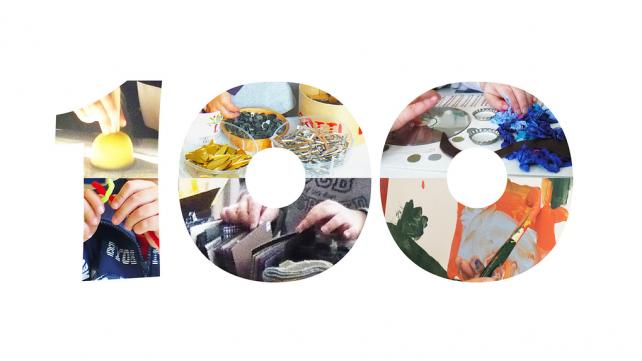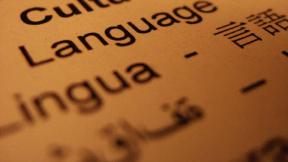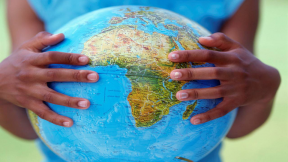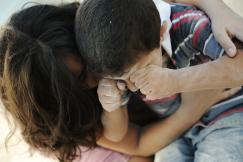
Isn't it amazing how a child, even at the age of infancy is able to communicate with their caregivers in a meaningful way? SubhanAllah, All praise be to Allah, that, right there, is the beauty of Allah's creation and how we have been molded. In essence, the language acquisition process starts way before the child is even born. The fetus is able to familiarize itself with the faint sounds from the outside world. The language spoken then is purely based on feelings of warmth and love, where the baby kicks and the mother strokes her belly in a reassuring way.
Come to think of it, language is rather a social concept which develops as part of interactions that are based on social experiences. Soon after the child is born, every cry, giggle, squeal, has a meaning to it - which somehow only the parents, and most importantly mothers, are able to recognize. The cry for hunger is different to the cry for a diaper change. Likewise the cooings of curiosity are different to the cooings of excitement and joy.
The philosophy of 100 languages revolves around the hundred ways a child possibly expresses him/herself, without necessarily speaking. The hundred languages are a metaphor for the extraordinary potentials of children, their knowledge-building and creative processes, the myriad forms with which life is manifested and knowledge is constructed. This beautiful concept was coined by an Italian early childhood educator and humanitarian Loris Malaguzzi.
Malaguzzi viewed children as strong, powerful, and competent to learn through their own exploration and was instrumental in the creation of a network of preschools and infant-toddler centers in the town of Reggio Emilia. His educational philosophy has come to be known by that name and his manifesto is found in a beautiful poem called 100 Languages.
The Many Ways Children Communicate
More details are necessary to fully appreciate this view of learning. Here are some of these ways children engage and communicate with the world around them.
The Hands
Children love to make marks - be it on walls, floors, paper. When they are young, they may appear to be squiggles, but each mark has a meaning attached to it, just like each stroke for a painter. When we are using our hands, we are actually feeding our souls. Ever wondered why gardening, painting, writing, knitting, and cooking or baking are therapeutic? It’s because they allow us to release our emotions through our hands in the form of art. Subhan Allah, Allah has created our bodies in such a fashion where we are capable of finding solace within ourselves through these forms of expressions.

The Mouth
Young children often talk to themselves (imaginative play). They use language as a tool for regulating and guiding their actions, just like adults do (usually through a difficult task). You may find your little ones or even older ones for that matter asking too many questions. This is usually when they are either curious or speaking their fears out loud. In reality they are merely trying to develop their understanding of the world, concepts of right and wrong, seeking acceptance for their acts, and creating their own perceptions and beliefs from scratch, based on how we respond.

With Expressions
Imagine the sparkle in the eyes of a child at the sight of an ice cream truck or a sweet treat. Expressions can be so powerful. To help us understand our children better, we have to learn to be objective rather than subjective. Children do not simply react to words that are used, but also try to make sense of context, facial expressions, and body language to understand the meaning. For example, a frustrated child, who is still coping through a transitory phase in his life, may not be able to keep up with routines and show disinterest in play altogether.
With Sounds
Children exhibit their feelings and communicate through the medium of sounds as well - think humming a tune, skipping to the beat, revving up the engine of the toy car. You can easily tell whether the child is content and engaged when they are humming, or is excited when they are all chirpy, or when they are feeling low and heaving a deep sigh.
In Movements
In older children the language of confidence is demonstrated when a child does a flip, wheel cart or any other complex move in a flawless way. Similarly, in younger children, toileting needs are often communicated to parents and caretakers through body movements and expressions.

While Socializing
Socializing in children may not necessarily involve speech, rather it is through social interactions that young children are able to build upon their language skills as they learn to organize their play. There are definitely a lot of expressions involved, which help children acquire the language of emotions, resilience, confidence, and self-awareness. As parents, we need to acknowledge children’s feelings, their fears, and their needs so as to better support them from an early age and provide them with the right opportunities to allow them to grow in a developmentally appropriate way.
In Play
As mentioned earlier, children often tend to talk to themselves. Free play allows children to investigate a situation and form and test their hypotheses about it. As they do this, the children are encouraged to communicate their understanding about what they are doing through a form of symbolic “language.” This could include writing, drawing, sculpting, or expressing themselves through a variety of schemas while at play. Young children are often found involved in play that entails carrying objects, containing them, their positioning and arrangement. All of these actions indirectly allow them to figure out and test their speculations, leading to a wide array of learning possibilities.
With Love
Children exceedingly speak and understand the language of love. They need that space where they can feel safe, and heard regardless of any acts of disobedience. Value their intentions and actions, and you will notice how they will learn to regard and respect you even more. They say a child's love is unconditional, unless we teach him through our own example how to make it conditional through manipulation, shame, and reward.

Regardless of the debate on whether we, as parents, should nurture native language skills in our children from an early age or not, we first need to support our little ones through mastering a hundred ways to discover, think and learn in order to realize their truest potential.
Every child is unique, as are we as parents. We may encounter fairly easy challenges with one child, but an entirely different obstacle course with another - just like the four fingers on our hands are not the same. We have to understand and keep trying to improvise on our parenting skills in order to help our children achieve their full potential, so that they can turn out to be better and responsible adults to raise our future generations, InshaAllah.
Umm Ahmed is an early childhood educator and writer, who is passionate about seeking knowledge and passing it onto others. She and her husband are parents to three boys and are currently living in Abu Dhabi.






Add new comment